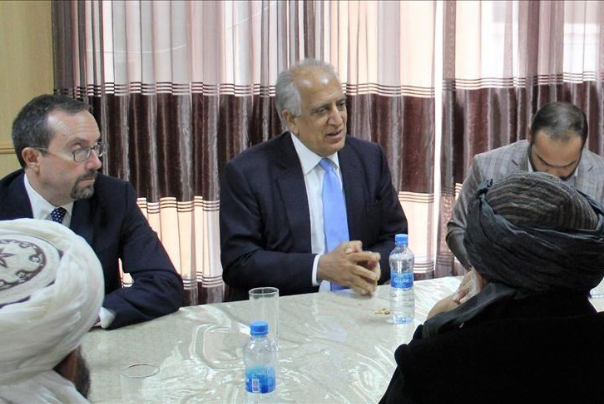
Since the views of the United States and Iran on the Afghan peace process are completely different, it is inconceivable for Iran to stand by the US in the Afghan peace process and help them.
NOURNEWS - Zalmai Khalilzad, the US State Department’s special envoy for peace in Afghanistan, recently claimed that Iran was not supporting the Afghan peace process and stability in the country due to tensions between Tehran and Washington. Khalilzad, speaking on the Internet at the invitation of the US Institute of Peace, also announced that the administration of Donald Trump had agreed to hold talks with Tehran officials to advance peace in Afghanistan. This position was met with a response from Tehran, and the Iranian embassy in Kabul issued a statement rejecting the US official’s false statements about Iran’s position on the Afghan peace process, stressing that the Islamic Republic of Iran supports peace talks based on Afghan ownership and leadership.
Regarding these remarks of Khalilzad, several points should be noted; First of all, regarding the offer to negotiate with Iran and Washington’s view on the role of the IRI in Afghanistan, it should be said that Iran’s role is very important. Because Iran is one of Afghanistan’s most important and influential neighbors. This influence is also seen naturally and historically in a significant portion of Afghanistan’s population. So the Americans, after realizing that they could not achieve their goal without involving Afghanistan’s great neighbors, such as Iran and Pakistan, in the peace process, have announced that they are willing to negotiate with Iran. The question now is whether these negotiations are possible given the conditions in the region, especially the agreement between Iran and China to sign a 25-year document of cooperation between and the extension of Iran’s 20-year contract with Russia. In response, it should be noted that the situation is not such that the United States could drag Iran on a course that serves US interests in Afghanistan.
In any case, Iran’s view of Afghanistan is the withdrawal of US troops from the country, the provision of conditions for inter-Afghan talks and the support of neighbors and influential countries in this process without US and NATO intervention. Since the United States and Iran have very different views on the Afghan peace process, it is inconceivable that Iran would side with the United States in the Afghan peace process and help them.
Another point is that Khalilzad is aware that against the unilateral view of the United States, which is more or less likely to fail; there is the view of Iran which believes peace and stability in Afghanistan must be achieved without the intervention of the United States and other trans-regional countries and with the participation of the Afghan government and the Taliban, as well as the cooperation of countries in the region. This line of thought has a greater chance of bringing peace and stability to Afghanistan. This means that if really important countries in the region, including Afghanistan’s neighbors like Central Asia, Iran, Pakistan, China, plus influential countries such as India, Saudi Arabia, UAE and Qatar, which do not share a border with Afghanistan, but in this country They have the power to reach an agreement with local ethnic, religious and political groups, including the Taliban, to bring peace and stability to Afghanistan, in which case a more lasting peace can be expected. Thus, one of the challenges to the US peace process is the neglect of the role of neighboring countries in the process, and perhaps for this reason some analysts say that the US peace process with the Taliban is likely to fail.
It should be noted that the view pursued unilaterally by the Americans, based on which they began negotiations with the Taliban, which ultimately resulted in Doha, has some shortcomings and ambiguities. Following the talks between Washington and the Taliban, an important agreement was reached between them, during which the Taliban accepted a series of commitments and the Americans a series of commitments. The Taliban’s commitment is not to allow anti-US forces to use Afghan territory against US interests or US allies in the region when they come to power in Afghanistan. The US commitment to the Taliban also includes the complete military withdrawal of its troops from Afghanistan. Of course, these issues include the public part of the US agreement with the Taliban, and many believe that this agreement also has a secret and confidential part. Among them is the Talibanization of power not only in Afghanistan but also in the region. This has largely raised concerns in Iran, Russia, China, Central Asia and India. However, Khalilzad’s visit to India after the deal apparently reassured Iranian officials that the part included in the agreement to prevent the Taliban from allowing radical Islamic forces to operate from Afghanistan against US allies would include India.
In line with this, the Pakistanis have also put a special policy on the agenda to withdraw anti-Indian forces such as Lashkar-e-Taiba, Jaish-e-Muhammad and Hezb-e-Mujahideen, which are fighting in Kashmir and are affiliated with ISIS, from the region and send them to Afghanistan. . If that happens, the Taliban may have reached a consensus with the Pakistanis that radical Islamic groups should not act against India.
But another issue here is the concern of Iran, China, Russia and Central Asia about the Talibanization of power in Afghanistan. Because of the Talibanization of power and the fact that the Taliban will not allow Afghanistan to become a place of pressure for US allies or jeopardize its interests in the region, it seems likely that if these radical forces act against US rivals, the Taliban and the United States will ignore this. Therefore, one of the reasons for the intensification of their contacts with the Taliban is related to these issues, so until these concerns are resolved, especially in Afghanistan’s neighboring countries, it is unlikely that Khalilzad will be able to implement the US peace plan in Afghanistan.
SCFR
No comments:
Post a Comment